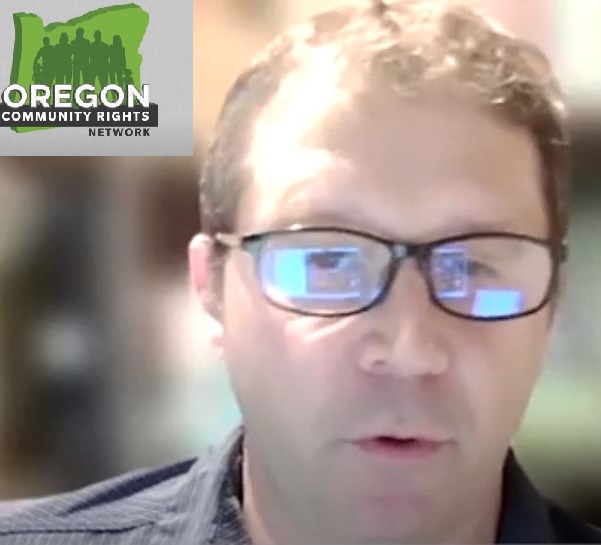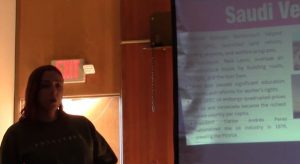Tribal nations, Ecuador protect life-supporting systems under ‘rights of nature’
11 min read
The Oregon Community Rights Network convenes a discussion, Water is Us. One of three guests was UO professor Craig Kauffman. Here is his discussion with OCRN board member Kai Huschke.
[00:00:11] Kai Huschke: Joining us is Craig Kauffman, rights of nature expert (welcome Craig). He has co-authored a book called The Politics of the Rights of Nature: Strategies for Building a More Sustainable Future. What is your sense of relationship to water, how would you describe that?
[00:00:25] Craig Kauffman: My answer would’ve been really different had you asked me this before I got my Ph.D. and started studying water for a profession. So I tried to actually put myself back in place when I was a normal person. And I realized the first thing that came to my mind was, honestly, when I was a child and growing up, water was really not just a symbol, but it was the expression of recreation and restoration, if you think of that as, like, spiritual.
[00:00:53] I grew up in Michigan and the Great Lakes region and spent all my free time, anytime I could, going to the shores of the Great Lakes. And those are my fondest memories. Now that I’m in Oregon, my fondest memories and what I like to do with my own kids are going into the woods and playing in the rivers and kayaking with my kids.
[00:01:17] But the intellectual side of me and what I think about most now is: Water is the center of all of our social life and our economic life and our natural life and everything else. It really is the unifying factor because we need water to survive for consumption. There is no substitute for water, right?
[00:01:40] We need it to grow food here in the Pacific Northwest. We use it to make electricity. We use it as a waste dump to take all of our pollution and we want it to take it away. While it’s kind of become cliche now, Water Is Life, it really is that because it is the center of life. ‘Cause it’s the lens through which everything gets unified.
[00:02:03] Kai Huschke: What are you seeing out there? What is it that’s happening that you’re observing or hearing?
[00:02:08] Craig Kauffman: What scares me the most is the rapid privatization of water and the fact that very wealthy people in corporations, including many who previously were buying up oil fields as fast as they could because they saw that as a source of wealth, are now shifting to buying up water resources as fast as they can. Nestlé is doing the same thing, buying up as much of the world’s water resources as they can.
[00:02:38] And these people are doing that because they recognize the importance of water and they’re thinking long term, they’re looking decades out and realizing that things are going to get a lot worse than they are now in terms of water scarcity. And they believe that’s going to make it an economically valuable resource to hold. And so as long as they can hold property rights over it, they see that as the best economic investment out there.
[00:03:07] And that more than anything scares me. I’m from Michigan, the Great Lakes region, and Nestlé is desperately trying to buy up the Great Lakes as fast as they can, just like they are in many of the watersheds in California and elsewhere.
[00:03:23] And so it’s going to require, people standing up and saying ‘No!’, like realizing what will happen if water becomes a private commodity, that only those with access to enough money can purchase. Because there’s no substitute for water. It’s not a real commodity, ’cause there’s no substitutes.
[00:03:42] Kai Huschke: Expanding on, Craig, what you set up, that an entity or even an individual can own water, that we have a system that allows someone to have so-called water rights and everything that goes along with it: How would you describe our current reality? What are we up against these days?
[00:04:00] Craig Kauffman: There’s really three main things. First, as I said, water is seen as a resource and not just any resource, as a commodity.
[00:04:07] And then the second thing is that water tends to be seen as totally separate and disaggregated from the watershed. Just as a forest ecosystem is more than just a bunch of trees that are planted together, a watershed is more than just the H2O molecules that are flowing through it. But we don’t tend to think of it like that. We don’t see how water is integrated into larger systems.
[00:04:31] And even worse than that, in terms of our political structures that are intended to manage water, water is treated as a distinct entity depending on different policy spheres. Putting aside even whether or not we can manage nature, we don’t even attempt to do it in an integrated fashion, understanding how water is connected to everything else.
[00:04:56] We separate how we deal with water for energy, separate from how we deal with water for agriculture, and that’s separate from how we deal with water for consumption, and that’s separate from how we deal with water in regards to pollution.
[00:05:14] And so decision-making is just divided in a whole bunch of threads, which undermines our ability to (1) just conceptualize and understand water as it ties together other aspects of the system, but (2) it undermines our ability even to just take coordinated common-sense action.
[00:05:37] Kai Huschke: What would you say about rights of nature and how that works in the sense of water and watershed protection, compared to what’s happening and the way that the current system sees it?
[00:05:48] Craig Kauffman: There’s just so much I could say about that, so, (laughing) I think I’ll not try to say everything and just start.
[00:05:57] The biggest transformation that’s resulted from my thinking about rights of nature has really come from coming to appreciate things have value because of our relationship with one another and a relational approach to rights.
[00:06:14] If you study this theoretically, there are many different theoretical or philosophical arguments about why non-human things should have rights. The animal rights movement has adopted, what we might think of as it a properties-based approach or like an attributes-based approach, essentially drawing on the history of human rights where we say, ‘Humans have value and therefore rights because we have attributes that we thought were unique to us whether that’s consciousness or self-awareness or ability to feel pain.’
[00:06:45] Of course, we are not unique at all in that sense. And so, some aspects of the animal rights movement grew up and said, ‘Okay, well, we’ll continue and maintain that attributes- or properties-based approach, but we recognize that there are non-human animals that share these attributes or properties, and so we should advocate rights for them as well.’
[00:07:07] But I’ve come to believe that that’s not actually a good or helpful sort of logical argument for why we should recognize non-human things in the world as being valuable and therefore deserving of rights. The natural world isn’t just a set of pieces/parts that we can take apart and rearrange as we like, to try to manipulate to satisfy ourselves or try to set aside some problems that humans have. It’s really a system and a living system.
[00:07:39] This was my transformation personally, is coming to recognize the importance of really thinking in terms of systems and relationships and recognizing that humans are embedded in these systems.
[00:07:51] And that’s been helpful for me too because especially in my teaching when I teach about environmental politics, so much has been this history of this debate between anthropocentrism versus ecocentrism. That is a false dichotomy that is unhelpful, that we need to get past. Because it reinforces this idea that humans are separate and apart from nature, which is based on this idea that humans are somehow unique and therefore deserving of greater value and therefore more rights.
[00:08:21] But when you take a systems approach and you say that everything in the natural world is interrelated and interdependent based on these reciprocal relationships, and therefore we’re all mutually interdependent—human and non-human alike, biotic and non-biotic alike—then you can get to a place where you recognize that all of the different elements or entities in the natural world have value because of the role that they play in maintaining the overall system.
[00:08:54] And humans are part of that, right? So it’s not devaluing humans. It just means that we’re not any more or less deserving of value and therefore rights than any of the other entities in the system, right? But that doesn’t necessarily mean that we don’t value other entities. And once you recognize our interdependence, it can actually be a little bit freeing and empowering in a way.
[00:09:19] Kai Huschke: Clearly we have a reality that sees nature as Craig, you pointed out a number of times, as a thing, as a commodity. And rights of nature is really about pivoting away from that, probably a good 180 degrees. And in practice though it’s still fairly new, it’s only something that’s really been out there, let’s say, in a western legal construct, for little over 15 years. So where are we today, despite the newness of it all?
[00:09:43] Craig Kauffman: One of my main projects over the last couple years has been to create what’s called the Eco Jurisprudence Monitor. There are actually, last time I checked 339 legal provisions, recognizing rights of nature around the world. So this is not an isolated small thing. And 219 of these have been approved. So like roughly two thirds have been approved.
[00:10:07] Most of you probably know that the Yurok Tribe also passed a tribal law, recognizing rights for the Klamath watershed. And I talked to members of the Yurok Tribe to understand their decision-making and why they designed it the way they did.
[00:10:22] And they told me that originally it grew out of concern over salmon. So the Yurok initially were thinking of, maybe like a rights of salmon law. But after talking about it and considering it for a long time, they realized that actually their ability to protect salmon would be strengthened if they recognized rights of the whole watershed as a system, rather than just focusing on the animal species itself, because, you know, if the watershed is functioning okay and is healthy and flourishing, the salmon will be okay.
[00:11:01] In terms of implementation, in some other countries they have stronger laws and it’s been around long enough where you can actually see some implementation. And Ecuador is really the main country there, both, because you probably all know it recognizes rights of nature in the constitution, so it’s strong.
[00:11:19] And it’s been around now since 2008, long enough for the courts to actually start—it’s one thing to have these general principles in a constitution, but it’s another thing to restructure, rewrite your regulatory policy based on this to set criteria for: ‘How would you measure if you know the rights of a watershed are being violated or not?’
[00:11:40] And over the last five years, Ecuador’s Constitutional Court has been selecting cases specifically to establish this binding jurisprudence about what does it mean to enact rights of nature.
[00:11:57] Rights of nature has meant that you can no longer get away with a development project, whether it’s mining or other kinds of extractivism or other kinds of polluting activity over consumption just because you did an environmental impact assessment and you got the Ministry of Environment to give you a license or a permit. You have to instead show that your activity does not violate the rights of the watershed. And then the court then has laid out very specific criteria for measuring whether that’s the case.
[00:12:30] They’ve enacted the precautionary principle. So in the United States, the burden of proof is on citizens to try to prove that some activity harms some legal subject to such an extent that it’s worthy of defense or so forth, which is almost impossible to do in our legal system. The Ecuadorian court, because of rights of nature, has flipped that. So now the burden of proof is on polluters or extractivism to show that their actions are not going to violate rights of nature, the rights of watershed.
[00:13:05] And so then they, that raises the question, if you’re going to do this in practice, how do you measure whether or not a watershed’s rights have been violated or not? And the courts essentially created a very specific framework for measuring water-related ecosystem rights in terms of four parts:
- An ecosystem’s ability to access its affluents (its tributary streams and other water resources);
- Its ability to regulate and restore its flow;
- Its ability to maintain biodiversity (Right? So it’s recognizing watersheds as habitats for species as well); and
- Its ability to preserve its natural hydrological cycle.
[00:13:48] In a separate case in Los Cedros they were going to cause the extinction of an endangered species, which violated one of the criteria for having a healthy watershed, which basically says you can’t damage a watershed ecosystem to such an extent that it can’t serve as a viable habitat for species to the point where the species goes extinct. That’s a sort of a line that you cannot cross. The rights are violated.
[00:14:18] So again, it’s emphasizing this idea of government regulatory policy has to be based on an understanding of a watershed as an ecosystem that serves a bunch of different functions, one of which is providing habitat. And that in Ecuador, they were able to gain stronger protection for species by emphasizing the right of a watershed to maintain a viable habitat.
[00:14:48] Kai Huschke: One of the big things that you just brought up was The Precautionary Principle, you know, this idea of assessing what potentially could happen before you allow it to happen, as it’s linked to this idea of then assessing: ‘Will rights be violated?’ It is very much the opposite of where we sit today… Craig, any sort of last thoughts you want to leave, from, just to kind of send us off.
[00:15:09] Craig Kauffman: In my opinion, the ultimate purpose of all this work is to try to enforce and facilitate a paradigm change. Because, I mean, you can only do so much through coercion through the courts or whatever, you know, ideally, we need to get people to just undergo this paradigm change so we voluntarily change our own behaviors, in a way to coincide with the way human societies used to always live.
[00:15:36] And so, I guess for those of us fighting this fight that can seem like an impossible fight, the nature of systems change is that you work and work and work for a long time and nothing seems to happen, and then all of a sudden you hit a tipping point and things shift and then, you know, there’s this rapid, dramatic change, to a new stasis of the system. And I truly believe that that’s kind of what’s happening, and that it’s important to remember that, because that’s (I think) what can help sustain us in a project that may just seem impossible to achieve.
[00:16:13] Kai Huschke: Thank you, Craig. Well said.
[00:16:16] John Q: Kai Huschke for the Oregon Community Rights Network talks with UO professor Craig Kauffman, one of the participants in the February 23, 2023 program Water Is Us.







